When people think of plant pests, the first thing that comes to mind are arthropods, specifically insects. Unfortunately, there are more than just arthropods that are considered plant pests. One of these examples are terrestrial slugs and snails.
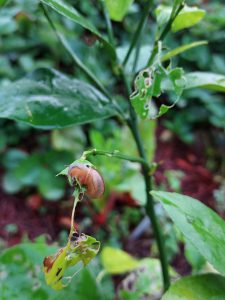
How can I identify these pests?
Slugs and snails are mollusks. They are biologically similar; the difference is that slugs lack a hard spiral shell. Apart from the hard spiral shell in snails, both slugs and snails are soft-body mollusks, that use a muscular foot for movement that constantly secretes mucus to aid in their motion. This mucus, when it dries out, leaves a mark on the surface where the mollusk moved. This is what we call a “slime trail.” Furthermore, these pests prefer places that have moist and cool conditions, and tend to hide from the heat in places such as the topsoil. Because of this, scouting is important (specifically during nighttime) to be able to find them and identifying these slime trails will provide evidence of their presence in the plants.
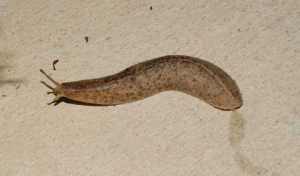
Credit: Lyle J. Buss, UF/IFAS
Are they females and males?
Terrestrial slugs and snails have both male and female reproductive organs. This means that all of them can lay eggs. They lay eggs multiples times a year. Eggs vary in color, shape, and size depending on the species. Also, sexual maturity can be as fast as just a few months or several years depending on the species.
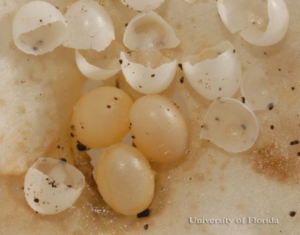
Credit: Lyle J. Buss, UF/IFAS
How can they damage my plants?
Most terrestrial slugs and snails feed on leaves. They will prefer succulent plant tissue such as seedlings, herbaceous plants, and ripening fruits. Damage looks like irregular holes with smooth edges on the leaves they feed on or missing succulent plant parts that appear clipped. As mentioned before, the slime trail is an indicative of their presence and is visible in most cases on the surrounding of damage leaves.
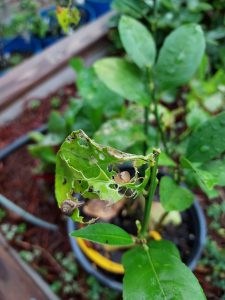
How can I control these pests?
There are several methods to control terrestrial slugs and snails, and these include:
Biological control: There are predatory snails such as the Rosy Wolfsnail (Euglandina rosea) that will feed on several species of invasive snails and 3 native snails of Florida. The Rosy Wolfsnail is one of several predatory snails found in Florida. For more information about predatory snails access the ask IFAS publication called: SNAIL-EATING SNAILS OF FLORIDA, GASTROPODA.
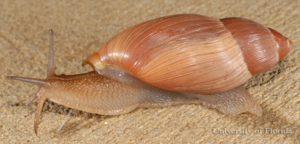
Credit: Lyle J. Buss, UF/IFAS
Cultural Control: As mentioned before, slug and snails prefer moist places. Eliminating mulch, ground covers or any other materials that may contain an excessive amount of moisture and avoiding over irrigation are good practices to avoid the presence of these pests. Scouting is also a good practice, specifically at night, and checking the underside of plant pots to monitor their population.
Mechanical / Physical Control: There are several methods such as mollusk traps that are considered effective controlling slugs and snails. Basically, these traps attract these pests, allowing them to enter, but blocking their escape. The use of barriers such as copper foil and screening is believed to react with the mollusks slime blocking them to cross these barriers. Another common method is to hand remove them, although, this is a very time-consuming effort, especially in large operations.
Chemical Control: There are several molluscicides available. Most of them are formulated as baits; the majority kill by ingestion but some kill by contact. Unfortunately, none of these are completely effective because mollusks have learned what toxins harm them. Always read the label of any pesticide if you want to confirm is it made for mollusks control, what plants can it be spray on, and what are the re-entry intervals of the pesticide.
Conclusion
Although, the majority of plant pest are arthropods there are exception like terrestrial slugs and snails. It is important to know their physical appearance, their behavioral habits, and reproductive patterns to correctly control them. Always choose the most continent effective methods of control you have available and combine them, if possible, for better control.
For more information about terrestrial slugs and snails access the following ask IFAS publications:
TERRESTRIAL SLUGS OF FLORIDA (GASTROPODA: STYLOMMATOPHORA)
TERRESTRIAL SNAILS (PHYLUM MOLLUSCA, CLASS GASTROPODA) AFFECTING PLANTS IN FLORIDA
University Of Florida is an Equal Opportunity Institution
Source: UF/IFAS Pest Alert



